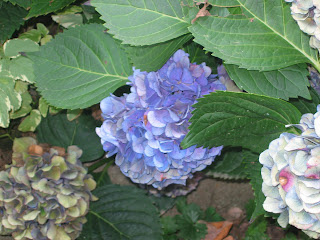
I really want a brownie. They sit, deliciously, on the kitchen counter. Waiting and sure like the most popular girls at the party - knowing full well their seductive perfection will eventually break even the most stalwart around them.
My husband will eat one. Heated and topped with tasty ice cream flecked with real vanilla beans. He has been planning it since dinner, which was a belated Thanksgiving meal. Bloaty and voluminous... roasted chicken, pan gravy, zucchini spinach casserole, stuffing, and rolls. Good, but all too easy to dally in a bit too long.
Food has always been an ambiguous element in my life. From an early age, I was overweight, and I spent a very long time trying to figure out how my body really wanted to eat. Coupled with that was a generationally and perhaps metaphysically (and/or environmentally) inherited tendency to connect food with emotion: comfort, ease, safety, calm... a response to depression, shame, anxiety, and fear.
It's better now; I am more aware of those inner voices and the patterned chatter of my "bad choices" mind. This does not mean I no longer overeat or choose to answer sadness with chocolate—but I do so now with increased awareness and mindfulness. Which makes it impossible to pretend it's out of my control.
This weekend, I purchased Clean Food: A Seasonal Guide to Eating Close to the Source with More Than 200 Recipes for a Healthy and Sustainable You by Terry Walters. I had read an article somewhere highlighting the season's best cookbooks, and this one grabbed me with its whole foods emphasis and sustainability ideals.
What I did not realize was the author also understands the emotional attachment we so often connect to eating... and the book begins with a very honest discussion of what one can do in the face of his or her more negative eating patterns.
Interestingly, one day before seeing the book in the store and deciding to purchase it, I had spent four hours at the temple for a Thanksgiving retreat. This entailed silence and mindful practice during eating, then stretching, and then three hours of meditation. No eye contact, no speaking, and no negative thoughts.
At first, I found it odd to be sitting at a table with several other people actively engaged in a similar spiritual pursuit without making eye contact, smiling, or speaking with anyone. It seemed rude and unnatural to me.
But as I ate my evening snack, I realized how rare it is that I truly spend time with my food. It was just me and my bowl of selected vittles, and the silence enabled me to really experience my food and the process of eating moment by moment. It was quite a gift, because in the buzz and whir of my regular day it's somewhat impractical to take such time to savor, notice, ingest, and altogether know my food.
So I carry the lesson forward, notice I am over-full, and ultimately decide to forgo the scintillating brownies with their sexy Dutch cocoa and naughty chocolate chips. Maybe this is willpower. Maybe it's mindfulness. No matter what, I know I'll feel better for it in the morning.
Maybe your downfall is food too. Maybe it's smoking, drinking, sex, drugs, shopping, lying, hiding, or hostility. When something becomes a form of running away - when it replaces an experience and becomes hollow and empty in the doing - it might be time to think about what place it has in your life, how it actually makes you feel when you engage in it, and whether it's worth continuing.
May you feel empowered to say no when you need to. May you stay awake to your self, and take care of you accordingly.











